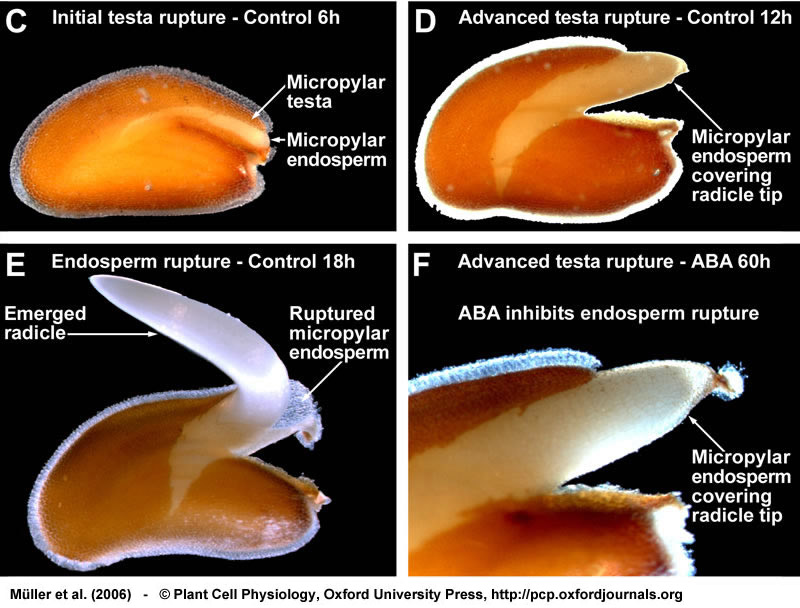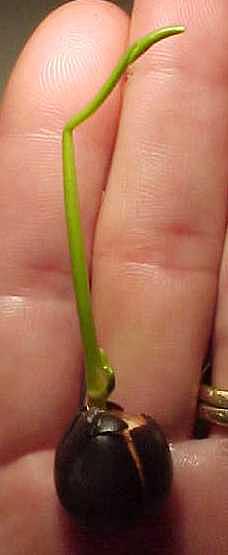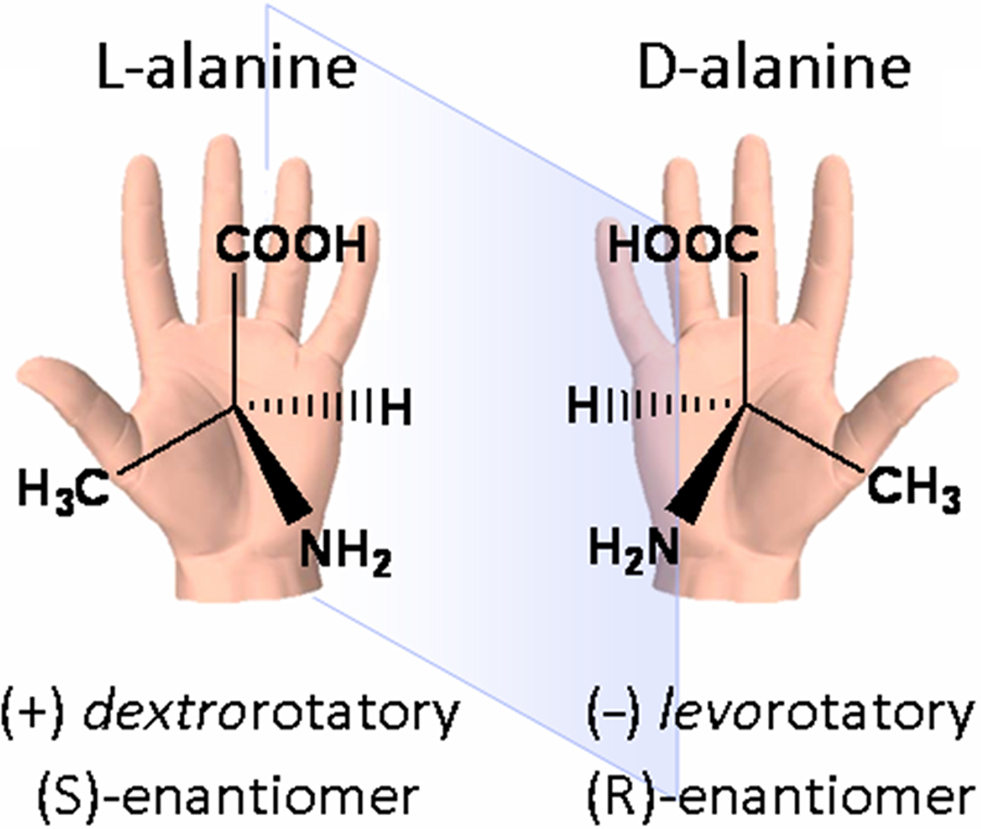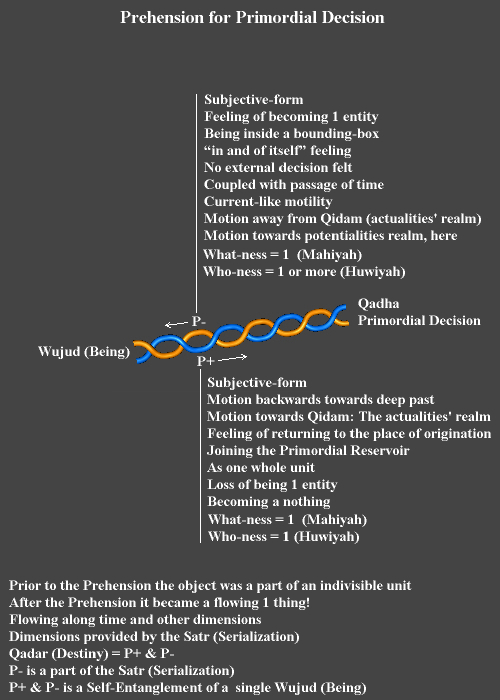Sunderer

Discussion Join
See Also:
http://untiredwithloving.org/singularity_i.html
Contents:
Singularity
Fatara
Falaqa
Shaqqa
Templates Mu-n-fa’il, ‘I-n-fi’al
Singularity
We are surrounded by singularities no matter where and when and what and how we examine.
A singularity separates realm A from realm B, where each realm are endowed with structures and rules for existence of the entities within them. There is no way the two realms could immix and if they could they both would have had perished. They can coexist since the singularity forbids them to commix in whatsoever way.
By observation we can see that in some cases entities from realm A find a way to appear in realm B, but transformed. Transformed since the original entity in realm A (stars) cannot exist in real B (polygons), for that matter the entity in realm A must transform to structure allowable in realm B.
For example a larva crosses the singularity of a cocoon to adopt new rules of motion i.e. rapid aerial flight abandoning the completely incompatible slow crawling motion on branches. Or ice in solid form, suddenly becomes liquid.
This translocation has the ‘feel’ of passing through a ‘breakage’ in singularity!
For briefest moment of time a breakage occurs, entity instantly translocates from realm A into realm B, breakage closes and the entity is transformed into something completely different, no longer in realm A, but now in realm B.
For example acorn is a seemingly un-living organism in a hard shell, suddenly breaks the shell and is a soft living sprouting plant.

Remark: The motion and processes for translocating from realm A to realm B are not continuous nor smooth, so to say. There is a jump, thus the verbiage ‘breakage’. Something breaks, crystal ice instantly becomes liquid water i.e. something totally different. In order to be specific, use the word Sunder for breakage in the singularity.
The Singleton Sunderer the active agent that does the breakage, and in Qur’an IT is named as Fatir (Sunderer). And there are no other sunderers.
Breakage as such has three categories:
1. Fatara: Cosmos Wide Breakage
2. Falaqa: Breakage with splinters (shattered subparts)
3. Shaqqa: Breakage when the beginning or head of something pushes through
Each category is highly particularized form of breakage.
Fatara
Mufradat
Isfahani
The origin of the word Al-Fatr is Shaqq(Narrow opening, crack, fissure, split, slit, gap, tear, rip) along the length of an object.
Fatra-t of animal means to milk it by means of two fingers, Fatra-t of dough means to knead the dough (by fingers) into bread. (Dara: let’s call this Handiwork)
Lisan Al-Arab
Ibn Manzour
Fatara the fingers means fingers moved to sign some expression.
لسان العرب ابن منظور
وفَطَر أَصابعَه فَطْراً: غمزها
Al-Fitra-t: Allah Fatara the creation means Allah brought entities into being and invented them in a form (like kneading the dough) trained for a particular way of action (behavior):
فِطۡرَتَ ٱللَّهِ ٱلَّتِى فَطَرَ ٱلنَّاسَ عَلَيۡہَاۚ
30:30. Allah‘s Handiwork, that which, Fatara people conformally (according to the design of the handiwork)
Allah’s Handiwork has focused and positioned the human nature to believe (in Tauhid (Divine Oneness))
مفردات ألفاظ القرآن. – للأصفهاني
كتاب الفاء
فطر
-أصل الفطر: الشق طولا، يقال: فطر فلان كذا فطرا، وأفطر هو فطورا، وانفطر انفطارا. قال تعالى: {هل ترى من فطور} <الملك/3>، أي: اختلال ووهي فيه، وذلك قد يكون على سبيل الفساد، وقد يكون على سبيل الصلاح قال: {السماء منفطر به كان وعده مفعولا} <المزمل/18>. وفطرت الشاة: حلبتها بأصبعين، وفطرت العجين: إذا عجنته فخبرته من وقته، ومنه: الفطرة. وفطر الله الخلق، وهو إيجاده الشيء وإبداعه على هيئة مترشحة لفعل من الأفعال، فقوله: {فطرت الله التي فطر الناس عليها} <الروم/30>، فإشارة منه تعالى إلى ما فطر. أي: أبدع وركز في الناس من معرفته تعالى، وفطرة الله: هي ما ركز فيه من قوته على معرفة الإيمان، وهو المشار إليه بقوله: {ولئن سألتهم من خلقهم ليقولن الله} <الزخرف/87>، وقال: {الحمد لله فاطر السموات والأرض} <فاطر/1>، وقال: {الذي فطرهن} <الأنبياء/56>، {والذي فطرنا} <طه/72>، أي: أبدعنا وأوجدنا. يصح أن يكون الانفطار في قوله: {السماء منفطر به} <المزمل/18>، إشارة إلى قبول ما أبدعها وأفاضه علينا منه. والفطر: ترك الصوم. يقال: فطرته، وأفطرته، وأفطر هو (انظر: الأفعال 4/12)، وقيل: للكمأة: فطر، من حيث إنها تفطر الأرض فتخرج منها.
Lisan Al-Arab
Ibn Manzour
Fitra-t to invent but for the first time. Allah Fatara means Allah created the people and started them (for the first time). Ibn Abbas said I could not understand what Allah is Fatir of heavens and earth means until I heard two bedouins arguing over a well when one said: I Fatara this well i.e. I started this well.
لسان العرب ابن منظور
.وفَطَرَ الله الخلق يَفْطُرُهم: خلقهم وبدأَهم. والفِطْرةُ: الابتداء والاختراع. وفي التنزيل العزيز: الحمد لله فاطِرِ السمواتِ والأَرضِ؛ قال ابن عباس، رضي الله عنهما: ما كنت أَدري ما فاطِرُ السموات والأَرض حتى أَتاني أَعرابيّان يختصمان في بئر فقال أَحدهما: أَنا فَطَرْتُها أَي أَنا ابتدأْت حَفْرها. وذكر أَبو العباس أَنه سمع ابن الأَعرابي يقول: أَنا أَول من فَطَرَ هذا أَي ابتدأَه.
Fatir is the grammatical agent of verb Fatara i.e. the Sunderer, the sunderer across the cosmos, the starter of all objects going through the cosmic-wide sunderance of singularity.
Falaqa
Mufradat
Isfahani
Falaqa is Shaqq(Narrow opening, crack, fissure, split, slit, gap, tear, rip) of an object when some broken parts of it are discernible and patent from other parts. (Dara: you might say something breaks open to see what is inside)
Faliq is the grammatical agent, the doer of Falaqa or the sunderer.
Dara: Faliq of Dawn is the sunderer of the singularity of darkness, breakage through which light appears.
مفردات ألفاظ القرآن. – للأصفهاني
كتاب الفاء
فلق
-الفلق: شق الشيء وإبانة بعضه عن بعض. يقال: فلقته فانفلق. قال تعالى: {فالق الإصباح} <الأنعام/96>، {إن الله فالق الحب والنوى} <الأنعام/ 95>، {فانفلق فكان كل فرق كالطود العظيم} <الشعراء/63>، وقيل للمطمئن من الأرض بين ربوتين: فلق، وقوله: {قل أعوذ برب الفلق} <الفلق/1>، أي: الصبح، وقيل: الأنهار المذكورة في قوله: {أم من جعل الأرض قرارا وجعل خلالها أنهارا} <النمل/61>، وقيل: هو الكلمة التي علم الله تعالى موسى ففلق بها البحر، والفلق: المفلوق، كالنقض والنكث للمنقوض والمنكوث، وقيل الفلق: العجب، والفيلق كذلك، والفليق والفالق: ما بين الجبلين وما بين السنامين من ظهر البعير
Tafsir Kabir
Razi
Al-Falaq is breakage, between ‘Adam (Non-being) to Being (Wujud), necessary for an object to become (in our world here). And the Aql (Intellect) imagines Non-being as a continuous connected gap-less darkness without any form of crack or opening or fissure, then when the object appears existing (in our world) then Aql(Intellect) renders a breakage.
تفسير مفاتيح الغيب ، التفسير الكبير/ الرازي (ت 606 هـ)
القول الأول: وهو مروي عن ابن عباس وقول الضحاك ومقاتل: { فَالِقُ ٱلْحَبّ وَٱلنَّوَىٰ } أي خالق الحب والنوى. قال الواحدي: ذهبوا بفالق مذهب فاطر، وأقول: الفطر هو الشق، وكذلك الفلق، فالشيء قبل أن دخل في الوجود كان معدوماً محضاً ونفياً صرفاً، والعقل يتصور من العدم ظلمة متصلة لا انفراج فيها ولا انفلاق ولا انشقاق، فإذا أخرجه المبدع الموجد من العدم إلى الوجود، فكأنه بحسب التخيل والتوهم شق ذلك العدم وفلقه. وأخرج ذلك المحدث من ذلك الشق. فبهذا التأويل لا يبعد حمل الفالق على الموجد والمحدث والمبدع.
Tafsir Kabir
Razi
6:95 Inna (Directional Actualizer, Forsooth) Allah (is) Faliq (Sunderer) of seed and fruit-kernel. IT causes the living to issue (exit) from the dead, and Issuer (exit-er) of dead from the living. That is for you (people) namely Allah.
Remark: Za-Li-Kum (That is for you (people)) is used in rare occasion as opposed to the oft-repeated standing phrase Za-Li-Ka (That is for you (Muhammad) the address is for all humanity to know Faliq sunders the singularity for seeds to sprout, sunders the darkness for the light to illuminate and sunders cosmos wide singularity for Taudhi (Divine Oneness) to appear as part of our innate inert nature.
IT causes the living to issue (exit) from the dead: Explicates (Tafsir, Bayan) the Faliq earlier in the sentence
While
Issuer (exit-er) of dead from the living: Is like a noun in conjunction to the earlier noun Faliq i.e. they are the same nouns the one that sunders the seeds and the one that issues the dead from the living.
تفسير مفاتيح الغيب ، التفسير الكبير/ الرازي (ت 606 هـ)
قلنا: قوله: { وَمُخْرِجُ ٱلْمَيّتِ مِنَ ٱلْحَىّ } معطوف على قوله: { فَالِقُ ٱلْحَبّ وَٱلنَّوَىٰ } وقوله: { يُخْرِجُ ٱلْحَىَّ مِنَ ٱلْمَيّتِ } كالبيان والتفسير لقوله: { فَالِقُ ٱلْحَبّ وَٱلنَّوَىٰ } لأن فلق الحب والنوى بالنبات والشجر النامي من جنس إخراج الحي من الميت، لأن النامي في حكم الحيوان.
Shaqqa
Lisan Al-Arab
Ibn Manzour
Shaqq(Narrow opening, crack, fissure, split, slit, gap, tear, rip) is a breakage in clear view or concealed.
لسان العرب ابن منظور
الشَّقُّ: مصدر قولك شَقَقْت العُود شَقّاً والشَّقُّ: الصَّدْع البائن، وقيل: غير البائن، وقيل: هو الصدع عامة. وفي التهذيب: الشَّقُّ الصدع في عود أَو حائط أو زُجاجة؛
Lisan Al-Arab
Ibn Manzour
Shaqqa plants means the earth cracked and plants germinated. And at that the very beginning of germination and sticking out.

Similarly Shaqqa the tooth of the infant means the first signs of new tooth pushing out of the gums.
Shaqqa the palm tree means its top leaves appeared.
Similarly Shaqqa is used for dawn as well.
لسان العرب ابن منظور
وشَقَّ النبتُ يَشُقُّ شُقوقاً: وذلك في أَول ما تَنْفَطِر عنه الأرض. وشقَّ نابُ الصبي يَشُقُّ شقوقاً: في أَوّل ما يظهر. وشقَّ نابُ البعير يَشُقُّ شقوقاً: طلع، وهو لغة في شَقا إذا فطر نابُه. وشَقَّ بصر الميِّت شقوقا: شخَص ونظر إلى شيء لا يرتدُّ إليه طرْفُه وهو الذي حضره الموت، ولا يقال شَقَّ بَصَرَه. وفي الحديث: أَلم تَرَوْا إلى الميِّت إذا شَقَّ بَصَرُه أي انفتح، وضَمُّ الشين فيه غيرُ مختار
والشَّقُّ: الصبح. وشَقَّ الصبحُ يَشُقُّ شَقّاً إذا طلع. وفي الحديث:فلما شَقَّ الفَجْران أمَرنا بإقامة الصلاة؛ يقال: شَقَّ الفجرُ وانْشَقَّ إذا طلع كأنه شَقَّ موضعَ طلوعِه وخرج منه.
أَشَقَّ النخلُ طلعت شَواقُّه
Therefore Shaqqa deals with breakage when the beginning of an entity shows through the breakage. Mufradat
Isfahani
54:1 The Hour (of Judgment) is nigh, and the moon is cleft asunder.
ٱقۡتَرَبَتِ ٱلسَّاعَةُ وَٱنشَقَّ ٱلۡقَمَرُ
The Arab used to make circumstances plain by moon e.g. the hardship of the Dooms Day is rendered by the splitting of the moon. (Hassan Basari)
كتاب الشين
شق
-الشق: الخرم الواقع في الشيء. يقال: شققته بنصفين. قال تعالى: {ثم شققنا الأرض شقا} <عبس/26>، {يوم تشقق الأرض عنهم سراعا} <ق/44>، {وانشقت السماء} <الحاقة/16>، {إذا السماء انشقت} <الانشقاق/1>، {وانشق القمر} <القمر/1>، وقيل: انشقاقه في زمن النبي عليه الصلاة والسلام، وقيل: هو انشقاق يعرض فيه حين تقرب القيامة (وهذا قول الحسن البصري، انظر: تفسير الماوردي 4/135)، وقيل: معناه: وضح الأمر (وذلك لأن العرب تضرب بالقمر مثلا فيما وضح أمره، قال الشاعر:
أقيموا بني أمي صدور مطيكم * فإني إلى قوم سواكم لأميل
فقد حمت الحاجات، والليل مقمر * وشدت لطيات مطايا وأرحل
Templates Mu-n-fa’il, ‘I-n-fi’al
Normally the Arabic verbs are of the tertiary form Fa-‘A-La, but some of their derivations occur in other exotic templates for example Shaqqa means breakage also ‘I-n-Shaqqa means breakage both in past tense. However ‘I-n-Shaqqa carries more semantic i.e. moon sundered but it was not the doing of the moon itself, the breakage occurred out of its control.
Other examples:
82:1 When the Sky is cleft asunder
إِذَا ٱلسَّمَآءُ ٱنفَطَرَتۡ
26:63 Then We told Moses by inspiration: “Strike the sea with thy rod.” So it divided, and each separate part became like the huge, firm mass of a mountain.
فَأَوۡحَيۡنَآ إِلَىٰ مُوسَىٰٓ أَنِ ٱضۡرِب بِّعَصَاكَ ٱلۡبَحۡرَۖ فَٱنفَلَقَ فَكَانَ كُلُّ فِرۡقٍ۬ كَٱلطَّوۡدِ ٱلۡعَظِيمِ
Mufradat
Isfahani
Normally a subject in a sentence is acted upon by the grammatical doer’s doing (verb).
Mu-n-Fa’il (or ‘I-n-fi’al) describe actions happening to the subject but there is no (obvious) grammatical doer even if the action commences from the subject itself. Examples: A person blushing, joy from hearing music or excitement of a lover at the sight of his beloved.
In general for Mu-n-Fa’il (or ‘I-n-fi’al) there is no grammatical doer, though the doer is assumed to be Allah.
مفردات ألفاظ القرآن. – للأصفهاني
كتاب الفاء
الفعل:
التأثير من جهة مؤثر، وهو عام لما كان بإجادة أو غير إجادة، ولما كان بعلم أو غير علم، وقصد أو غير قصد، ولما كان من الإنسان والحيوان والجمادات، والعمل مثله، والصنع أخص منهما كما تقدم ذكرهما (تقدم في مادة (عمل)، ومادة (صنع) )، قال: {وما تفعلوا من خير يعلمه الله} <البقرة/197>، {ومن يفعل ذلك عدوانا وظلما} <النساء/30>، {يا أيها الرسول بلغ ما أنزل إليك من ربك وإن لم تفعل فما بلغت رسالته} <المائدة/67>، أي: إن لم تبلغ هذا الأمر فأنت في حكم من لم يبلغ شيئا بوجه، والذي من جهة الفاعل يقال له: مفعول ومنفعل، وقد فصل بعضهم بين المفعول والمنفعل، فقال: المفعول يقال إذا اعتبر بفعل الفاعل، والمنفغل إذا اعتبر قبول الفعل في نفسه، قال: فالمفعول أعم من المنفعل؛ لأن المنفعل يقال لما لا يقصد الفاعل إلى إيجاده وإن تولد منه، كحمرة اللون من خجل يعتري من رؤية إنسان، والطرب الحاصل عن الغناء، وتحرك العاشق لرؤية معشوقه. وقيل لكل فعل: انفعال إلا للإبداع الذي هو من الله تعالى، فذلك هو إيجاد عن عدم لا في عرض وفي جوهر بل ذلك هو إيجاد الجوهر.
© 2013-2002, Dara O Shayda















